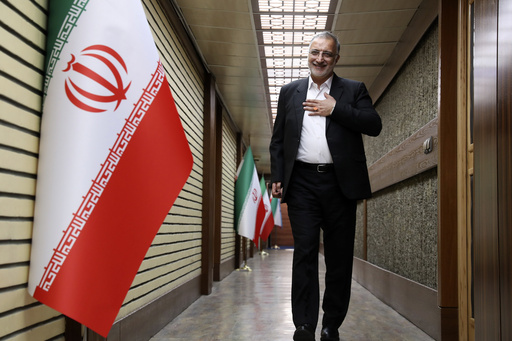TEHRAN, Iran (AP) — In the second live debate on state television, six presidential candidates on Thursday discussed Iran’s economic problems ahead of the country’s June 28 election following a helicopter crash last month that killed President Ebrahim Raisi and seven others.
It was the second of five debates planned in the days before the vote in a shortened campaign to replace Raisi, a hardline protégé of Supreme Leader Ayatollah Ali Khamenei once floated as a possible successor to the 85-year-old cleric.
Like the first debate, the second one also related to economics with the candidates discussing their proposals for Iran’s spiraling economy which is struggling under sanctions imposed by the United States and other Western nations.
The candidates also discussed inflation, the budget deficit, fuel consumption subsidies and education. They all promised to try to get the sanctions lifted and to introduce reforms, but none offered concrete details.
“Negotiation is a method of struggle,” said prominent candidate Mohammad Bagher Qalibaf, 62, with regards to getting the Western sanctions on Iran lifted. Qalibaf is a former Tehran mayor with close ties to the country’s paramilitary Revolutionary Guard.
He emphasized the destructiveness of the sanctions on the economy and said that Iranians have a right to a good life, not just an ordinary life.
Iran’s vice president, Amir Hossein Qazizadeh Hashemi, 53, said he will continue Raisi’s unfinished administration and vowed to develop the tourism industry.
Regarding the health sector and the emigration of doctors and nurses abroad, Qalibaf said there should be a fundamental change in the way health workers are paid to increase the motivation to stay.
Many doctors and nurses reportedly have left Iran in recent years over its deepening economic woes and poor working conditions. Qalibaf’s call for more pay for health workers was repeated by the other candidates.
All the candidates said they believe the Education Ministry is the most important part of the government because “the next generation of the country is raised in this ministry.” Qalibaf said the ministry’s budget must be increased.
The one pro-reform candidate, Masoud Pezeshkian, who is backed by pro-reform figures such as former President Mohammad Khatami and former foreign minister Mohammad Javad Zarif, thinks the economic crisis can be resolved by solving party differences inside the country as well as external factors.
The June 28 election comes at a time of heightened tensions between Iran and the West over Tehran’s rapidly advancing nuclear program, its arming of Russia in that country’s war on Ukraine and its wide-reaching crackdowns on dissent.
Iran’s support of militia proxy forces throughout the wider Middle East, meanwhile, has been increasingly in the spotlight as Iran-backed Yemen’s Houthi rebels attack ships in the Red Sea over the Israel-Hamas war in the Gaza Strip.




